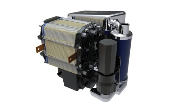 Reducing the cost of fuel cell technology has received a boost after the Carbon Trust announced that it was providing £1.95m of investment to Runcorn-based ACAL Energy and Sheffield-based ITM Power.
Reducing the cost of fuel cell technology has received a boost after the Carbon Trust announced that it was providing £1.95m of investment to Runcorn-based ACAL Energy and Sheffield-based ITM Power.
The fuel cell technology could be used under the bonnet of hydrogen powered cars by 2017-2020. Major manufacturers have already built hydrogen powered fuel cell cars, but the real challenge is to bring down the costs and, in the global race to do this, UK technologies are now in a strong position.
Production of state of the art fuel cell systems currently under development globally are forecast to cost approximately $50/kW at mass manufacture volumes. However, analysis by the Carbon Trust indicates that for these future fuel cell vehicles to compete with internal combustion engine cars, the cost of fuel cell systems must be reduced to about $35/kW.
The Carbon Trust cost analysis applies to projected costs for the period 2030-2050, when fuel cell vehicles reach mass production quantities (500,000 units per year). The comparison with internal combustion engine cars is based on a total cost of ownership analysis that assumes a product lifetime of 15 years, no taxes or subsidies on the fuels used and a peak power output of 85kW. Significant additional technological breakthroughs are needed to achieve this target of a 30% cost reduction.
Analysis by the Carbon Trust has identified that the technologies being developed by ITM Power and ACAL Energy have the potential to reach this automotive cost target if significant technological hurdles can be overcome.
One of the most important factors for bringing down the cost, size and weight of a fuel cell is increasing its power density – the amount of power produced for the size of the fuel cell.
Based on data provided by ITM Power, analysis by the Carbon Trust indicates that its membrane technology has the potential to reduce fuel cell costs to about $35/kW. As a result, the Carbon Trust is investing £1.1m which will be earmarked to further develop and scale-up ITM Power’s membrane technology for use in automotive applications.
Another significant way to bring down the cost of polymer fuel cells is to reduce the amount of platinum used. ACAL Energy have developed a new design of fuel cell that they call FlowCath. Inspired by the human lung and bloodstream, it uses a circulating liquid polymer cathode, creating a virtually platinum free low cost system with the added potential benefit of increased durability, making it highly attractive to vehicle manufacturers for their next generation fuel cell vehicles.
Analysis by the Carbon Trust, based on data provided by ACAL Energy, indicates that this technology also has the potential, subject to overcoming the technological hurdles, to reduce fuel cell system costs to about $35/kW. As a result, a further £850k has been invested by the Carbon Trust into ACAL Energy for continued development and scale-up of their FlowCath system.
The two investments come from the Carbon Trust’s Polymer Fuel Cells Challenge (PFCC) which was launched in 2009 to support the Department for Energy and Climate Change’s objectives to develop lower cost fuel cells and follows this year’s launch of the government’s UKH2Mobility project to ensure the UK is well positioned for the commercial roll-out of hydrogen fuel cell vehicles.
Energy and climate change minister Greg Barker said, “Driving down costs is essential to help fuel cells reach their potential in today’s market place. These exciting Carbon Trust investments, supported by government funding, should help to do just that, opening up new mass markets and securing major carbon savings. I look forward to seeing the results from these two innovative companies.”
Michael Rea, chief operating officer at the Carbon Trust, said, “British technology is in pole position to be under the bonnet of a next generation of mass produced hydrogen powered cars. After a lot of hype, fuel cell technology is now a great growth opportunity for the UK. It is anticipated that the first generation of hydrogen powered fuel cell cars are likely to roll off production lines around 2015. While they are expected to be lower carbon than internal combustion engines, they will also be more costly.
“The investments we have announced today we believe will help develop the technologies needed to bring down the costs of the next generation of fuel cell vehicles so that they can become price competitive with conventional internal combustion engine cars in the future.”



